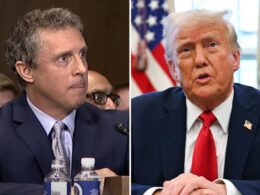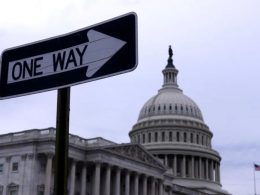WASHINGTON — Labor Secretary-designate Lori Chavez-DeRemer walked back her support for a pro-union law during a tense confirmation hearing on Wednesday — with the nominee’s fellow Republicans displaying the most skepticism about her choice.
Chavez-DeRemer, who represented Oregon’s Fifth Congressional District before losing re-election in 2024, was one of just three GOP lawmakers to vote for the Protecting the Right to Organize (PRO) Act, which would have ended legal protections for employees who don’t wish to join a union or pay dues.
So-called “right-to-work” laws offering freedom from unionization exist in more than two dozen US states — and more than a dozen Senate Republicans have been on the fence about Chavez-DeRemer due to her voting record.
Sen. Rand Paul (R-Ky.), who chairs a right-to-work caucus, homed in on that when questioning Chavez-DeRemer during Wednesday’s hearing in the Health, Education, Labor and Pensions Committee.
“About half the country has right-to-work laws, 26 states have them,” Paul said. “When you compare right-to-work states with non-right-to-work states, you see that the right-to-work states have double the employment growth. If you look at manufacturing jobs, they have five times the manufacturing job growth. If you look at disposable income in the right-to-work states, about $3,000 more per individual.”
“The PRO Act wasn’t just about organizing or enabling unions to organize, which they already have the right to do. The PRO Act was about overturning right-to-work laws,” the Kentuckian charged. “This is a tremendous, sort of, invasion of the states’ rights to decide these. This would be overturning right-to-work laws in half of the country.”
“The right to work is a fundamental tenet of labor laws, where states have the right to choose,” Chavez-DeRemer responded. “I signed onto the PRO Act because I was representing Oregon’s Fifth District, but I also signed onto the PRO Act because I wanted to be at that table and have those conversations. But I fully, fairly support states that want to protect their right to work.”
“So you no longer support the aspect of the PRO Act that would have overturned state right-to-work laws?” Paul pressed.
“Yes,” Chavez-DeRemer said.
Earlier, the nominee had dodged when Sen. Bernie Sanders (I-Vt.), the top Democrat on the HELP panel, asked whether she still backed the legislation.
“I support the American worker,” Chavez-DeRember said.
The Trump pick did, however, reaffirm her support for the Biden-backed Butch Lewis Act, a provision tucked into the $1.9 trillion American Rescue Plan to bail out several union pension funds.
The Teamsters pension fund ended up returning $127 million in overpayments from the $35.8 billion it received through the legislation after it was revealed the fund had around 3,500 deceased participants.
It’s unclear whether Chavez-DeRemer’s about-face will be enough to mollify Paul, whose vote on the HELP Committee has the potential to tank her confirmation before it receives a floor vote in the Senate.
Paul previously told Business Insider that a reversal on Chavez-DeRemer’s PRO Act support would make his decision easier. If any Republican on the committee opposes her, a Democratic panel member would have to step up.
Several of Trump’s more moderate cabinet nominees have also nabbed votes from Sens. Tammy Baldwin (D-Wis.), who sits on the HELP panel, and John Fetterman (D-Pa.).
Sen. Elizabeth Warren (D-Mass.) has also called Chavez-DeRemer “a strong candidate for the job.”
Former President Joe Biden and congressional Democrats tried to force the PRO Act through Congress — but it failed in the Republican-controlled House in 2023.
International Brotherhood of Teamsters president Sean O’Brien had advocated for Chavez-DeRemer to be Trump’s top labor official during a meeting at Mar-a-Lago last November, an insider previously told The Post.
“Your nomination has support from both unions and businesses. You are in a unique position to build a bridge between these two groups to benefit all workers,” Senate HELP Chairman Bill Cassidy (R-La.) told Chavez-DeRemer at the start of Wednesday’s hearing. “With potential labor disputes on the horizon, I am sure these relationships will be an asset to the Trump administration.”
“I appreciated our conversations on this issue. I now understand that your co-sponsorship of the PRO Act did not reflect your support of the legislation — but rather your interest in being part of any group that legislated on behalf of employees’ rights,” Cassidy added.
“I’m sure you will have the opportunity to explain your position and the Trump administration’s position and agenda moving forward during this hearing.”








